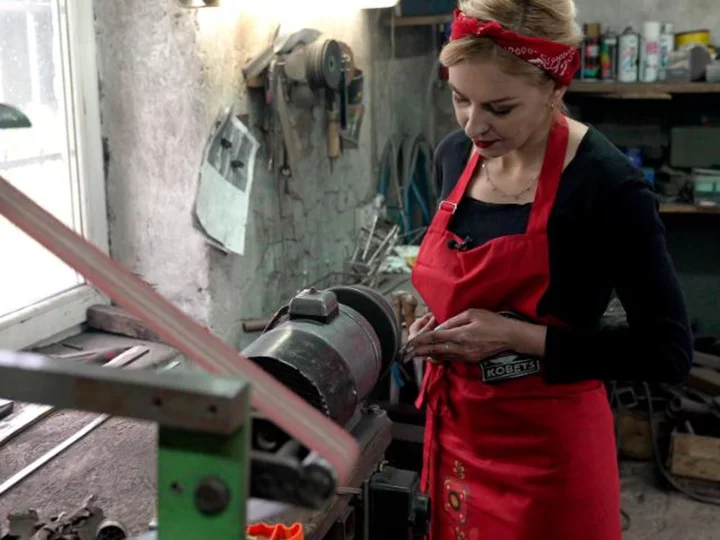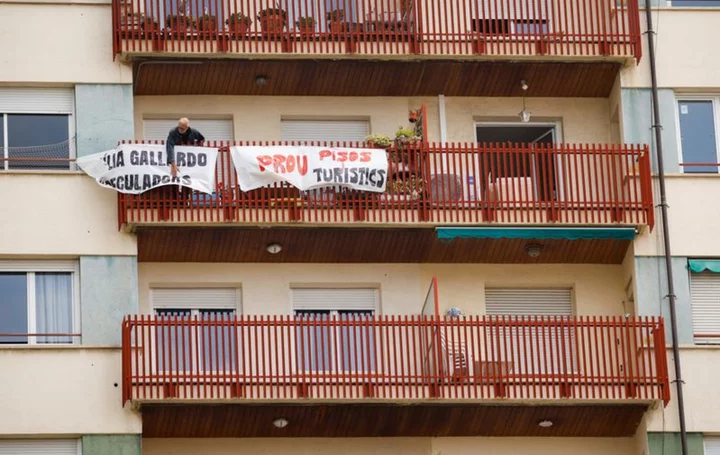As their country fights to repel Russia's forces, Ukrainian women are taking on roles and responsibilities previously unavailable to them, often in challenging and dangerous circumstances.
Thousands of Ukrainian men left their jobs to join the military and defend the country after Russia invaded almost 16 months ago. In their absence, Ukrainian women are stepping up. Ukrainian law previously forbade women from holding jobs deemed too dangerous.
Underground mining, forging hot metals, and operating heavy machinery -- these are just a few of the jobs Ukrainian women weren't previously permitted to do.
But when Ukrainian President Volodymyr Zelensky declared martial law after Russia invaded, thereby suspending the country's existing laws, Ukrainian women went to work.
Women have historically played a crucial role in the workforce during wartime, taking on jobs and responsibilities traditionally held by men -- as happened during both World Wars.
Tetiana, 38, descends from a family of coal miners dating back generations. CNN is not giving the full names of mine workers or the location of the mine due to security concerns. Her father, grandfather, and uncles all worked in the mines.
As a child, she dreamt of following in their footsteps, thousands of feet underground, but women weren't allowed. Instead, she worked on the surface as an automatic gas start operator, monitoring methane levels in the mine.
Coal mining is critical to Ukraine's energy sector, providing light and heat to the country.
When hundreds of miners were conscripted into the military, Tetiana's mining company asked for female volunteers to work underground. Tetiana was one of the first to raise her hand.
Tetiana, who's one of more than 45 women now working underground at the coal mine in eastern Ukraine, hopes to continue working inside the mine after the war. However, she and other women are fighting an uphill battle against traditional gender norms in her country.
The lead engineer at the mine, Oleksander, says that once Ukraine wins the war, he believes women will return above ground and do jobs "for women." Yet even Oleksander admits that the mine could not have kept operating without women like Tetiana.
In a northern Ukrainian town, Maria Kobets is another woman working in a non-traditional role. Wearing a red bandana and red lipstick, she is almost a mirror image of the World War II American propaganda poster "Rosie the Riveter."
She spends her days in the blacksmith forge owned by her husband, Andriy. Her husband was conscripted into the Ukrainian Armed Forces and fights on the front lines.
Before the war, her husband sold intricate metalwork for hundreds of dollars to clients in the United States and Europe. With her husband away, Kobets, 30, says it has become her mission to keep the family business afloat.
"I very often cry in the forge," she said. "My husband is defending us and is forced to be far from us, he performs combat tasks and this is very dangerous. But this work helps me to hold on and not fall apart."
Kobets enjoys working in the forge but says she hopes to give the reins back to her husband once Ukraine achieves victory.
"It's tiring work... but it is interesting. I would like to do it when I feel like it, not when I have to do it," she told CNN.
In different ways, these women are making significant contributions to their country. There are also 60,000 women serving in the Ukrainian armed forces, 5,000 of them in combat units, according to Yevheniia Kravchuk, a member of Ukraine's Parliament.
Breaking gender norms is challenging, but these women are paving the way for greater equality and, they hope, empowering themselves and future generations.









